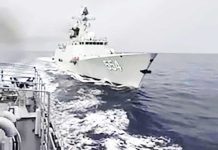
MANILA – Defense secretary Delfin Lorenzana said the possible review of the Mutual Defense Treaty between the Philippines and the United States may also result in its scrapping as he questioned whether the pact remains relevant to this day.
The treaty, signed by the two Pacific allies in 1951 during the Cold War era, requires one to defend the other in case of an attack in its territory.
But questions have been raised as to the Americans’ sincerity in upholding the commitment as the Philippines dealt with China in the South China Sea dispute.
“When that was done, there was this raging Cold War. Do we still have a Cold War today? Is it still relevant to our security? Maybe not,” Lorenzana said in a Palace press briefing.
Asked to clarify whether scrapping the MDT was one option, Lorenzana said: “Let’s see… We are going to approach this MDT, look at it in the backdrop of what’s happening in the area, in the interest of the nation, not the interest of other nations.”
Under the defense treaty, the two sides engage in regular war games that see thousands of US troops and state-of-the-art American military hardware brought to Manila.
The Philippines and the US have two other agreements governing the presence of US troops here: the Visiting Forces Agreement, which covers the conduct of American soldiers in the Philippines, and the Enhanced Defense Cooperation Agreement, which allows greater rotational presence of US troops in the country.
Lorenzana previously said it was the US interpretation that the treaty covers only “metropolitan” Philippines, noting that this does not include Philippine-occupied areas in the West Philippine Sea, the country’s exclusive economic zone in the disputed South China Sea.
Filipino troops are currently occupying 9 areas in the South China Sea, and the largest, Pag-asa Island, serves as the seat of government of Kalayaan town in Palawan.
Soldiers began occupying these areas in 1968, or 17 years after the MDT was forged.
Lorenzana said the Americans were “ambivalent” when it comes to the issue on whether the Philippine-occupied areas in the South China Sea are included in “metropolitan” Philippines.
The Philippines has long been at odds with China over several features in the West Philippine Sea where Beijing claims ownership.
Ties between Beijing and Manila, however, have substantially warmed under the leadership of President Rodrigo Duterte who refused to assert Manila’s claims in the disputed waters in exchange for investment opportunities with Asia’s largest economy. (ABS-CBN News)






